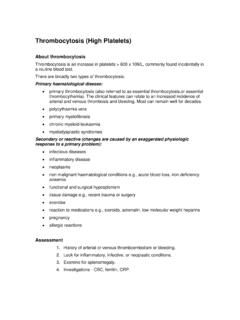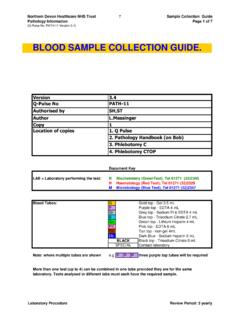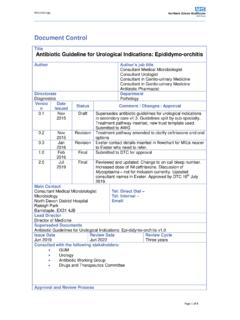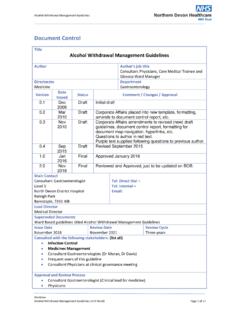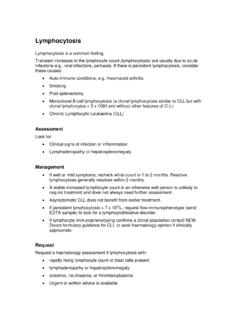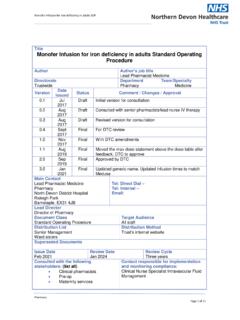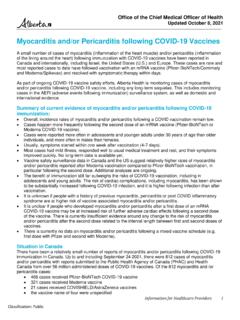Transcription of After care following insertion of suprapubic catheter
1 Leaflet number: 642 / Version number: 3 / Review due date: October 2021 1 of 5 After care following insertion of suprapubic catheter What is a suprapubic catheter ? A suprapubic catheter is a hollow flexible tube ( catheter ) that is used to drain urine from the bladder. It is inserted into the bladder through a cut in your lower tummy, a few inches below the navel (tummy button). This is done under a local, spinal or a general anaesthetic. Once you have had a suprapubic catheter fitted at North Devon District Hospital, we will contact the district nurses to let them know and will send your GP a copy of your discharge summary. You will be given a catheter passport which contains all relevant information regarding your catheter and its care , so please read the information and always take it with you on your visit to the hospital, GP and the community nurse. following the procedure You will be given a discharge summary of your admission.
2 This contains important information about your admission and operation. If in the first few weeks After your discharge you need to call your GP or attend another hospital, please take the summary and this leaflet with you. It is important you drink at least six pints of water every day for the next two to three days to flush the system through and minimise any bleeding. It is normal to experience some pain and discomfort around the site of the catheter and some bleeding in your catheter bag. However, if this persists for more than 72 hours (unless you are on blood-thinning drugs) or your pain becomes severe then you should visit A&E. If you experience a high temperature or the urine has a strong odour, please contact your GP. It could be a urinary tract infection and you may need antibiotics. A small dressing will be placed on the incision site for a week. A district nurse should then contact you a day or two After the procedure to ensure the wound is healing and that you are managing your catheter with no problems.
3 Other formats If you need this information in another format such as audio tape or computer disk, Braille, large print, high contrast, British Sign Language or translated into another language, please telephone the PALS desk on 01271 314090. Northern Devon Healthcare NHS Trust After care following insertion of suprapubic catheter 2 of 5 How to care for your suprapubic catheter You should be able to lead a normal life as far as the catheter is concerned. However, personal hygiene is important to reduce the risk of infection. Wash your hands thoroughly, before and After . Try to shower every day using a clean cloth, unscented soap and warm water. Dry using a clean towel and pat the catheter dry. Clean around the catheter site with cooled boiled water or fresh wipes once or twice daily. If necessary, apply a clean dry dressing (only if there is a persistent discharge from the suprapubic site). Try to avoid constipation by drinking plenty of fluids including water ( to 2 litres).
4 There are two types of drainage bag: o Day bag this is worn under your normal clothes during the day and held in place by straps or a holster. o Night bag this is used while you re in bed. This is much larger and is attached to the leg bag to hold all the urine that drains from the bladder overnight. Change generally bags need to be changed every five to seven days, according to manufacturer guidelines. This can be done by yourself or your carer. However, should the leg bag become detached from the catheter or becomes dirty or damaged, a new bag should be used. Disposal drainage bags should be emptied, wrapped and placed with domestic waste. Alternate the leg you wear your drainage bag on. This minimises soreness at the catheter site. It is important to keep the catheter bag below the level of your bladder, as gravity will help with drainage. Always keep a spare catheter with you. catheter change Initially your catheter will need changing in 6 to 8 weeks.
5 This will be done by the specialist nurses in the urology suite. Subsequent changes can be done by the district nurse at 10 to 12 weekly intervals, depending on the type of catheter used and your own situation. You or a family member may also be taught to change the catheter . It is not unusual to see blood in the urine following a change of urethral catheter . Further supplies relating to your catheter can be obtained on prescription from your GP. Your district nurse may be able to help with this. Northern Devon Healthcare NHS Trust After care following insertion of suprapubic catheter 3 of 5 Will I still be able to have sex? Your sex life should not be affected as you can simply tape the catheter out of the way. Can I go swimming? You can swim, as long as the skin around the catheter has healed, is clean and dry and the swimming pool water is treated/clean. Afterwards, ensure your catheter site is clean and dried thoroughly.
6 If you choose to go swimming, there are smaller bags or catheter valves available that are more discrete. Can I drive? It is your responsibility to ensure you are fit to drive following surgery. You do not normally need to notify the DVLA unless you have a medical condition that will last longer than three months After your surgery and may affect your ability to drive. You should, however, check with your insurance company before returning to driving. Problems to look out for We have highlighted this using the traffic light system indicating the urgency with which you should seek medical attention (green = can wait for few days; red = immediate). Problem What to do Over growth of tissue surrounding the catheter site (granulation) Contact your district nurse or GP. They may be able to cauterise it with silver nitrate. Urine leaking through the urethra (the duct which conveys urine out of the body) Ensure the bag is draining.
7 Sometimes this can happen in small amounts despite the catheter draining properly. Discuss it with your GP in the first instance You may need to take some tablets. Urine leaking around your catheter Make sure the catheter is not full and is draining. Contact your GP or nurse. Problem What to do Prolonged pain Contact your GP or nurse Blood in the urine Drink plenty of fluids. Contact your GP or nurse. Problem What to do Northern Devon Healthcare NHS Trust After care following insertion of suprapubic catheter 4 of 5 catheter has fallen out It must be replaced as a matter of urgency (within an hour) or the track will close up and it will not be possible to reinsert the catheter . Contact your GP for immediate advice or come directly to A&E. Urine not draining into the bag Check there are no kinks in the tubing and the bag is below the level of the bladder. If it s okay and the catheter is still not draining, contact your GP or nurse or NHS 111.
8 Fever; redness/throbbing in the wound; any pus from the catheter See your GP immediately Are there any other important points in the After care ? (for consideration by district nurse/GP or A&E) If the catheter is blocked within four weeks of insertion , it may not be possible to change it as the channel between the skin and the bladder will not have healed completely. If blockage does occur within four weeks, it is important that the catheter is not taken out in an attempt to change it. It should be left in place and an additional catheter should be placed into the bladder through the urethra. Please inform the specialist urology nurse the following day using the contact details below. Who should I contact for more information? Specialist urology nurses 01271 311877 Your ward (if you have recently been discharged) Day Surgery Unit 01271 322455 Lundy Ward 01271 322724 Your urology consultant Patient support group The Bladder and Bowel Community is a support group for people who experience bladder and bowel problems.
9 Telephone: 01926 357220 Website: Northern Devon Healthcare NHS Trust After care following insertion of suprapubic catheter 5 of 5 Have your say Northern Devon Healthcare NHS Trust aims to provide high quality services. However, please tell us when something could be improved. If you have a comment or compliment about a service or treatment, please raise your comments with a member of staff or the PALS team in the first instance. care Opinion comments forms are on all wards or online at Northern Devon Healthcare NHS Trust Raleigh Park, Barnstaple Devon EX31 4JB Tel. 01271 322577 Northern Devon Healthcare NHS Trust This leaflet was designed by the Communications Department. Tel: 01271 313970 / email: PALS The Patient Advice and Liaison Service (PALS) ensures that the NHS listens to patients, relatives, carers and friends, answers questions and resolves concerns as quickly as possible. If you have a query or concern call 01271 314090 or e-mail You can also visit the PALS and Information Centre in person at North Devon District Hospital, Barnstaple.
10

